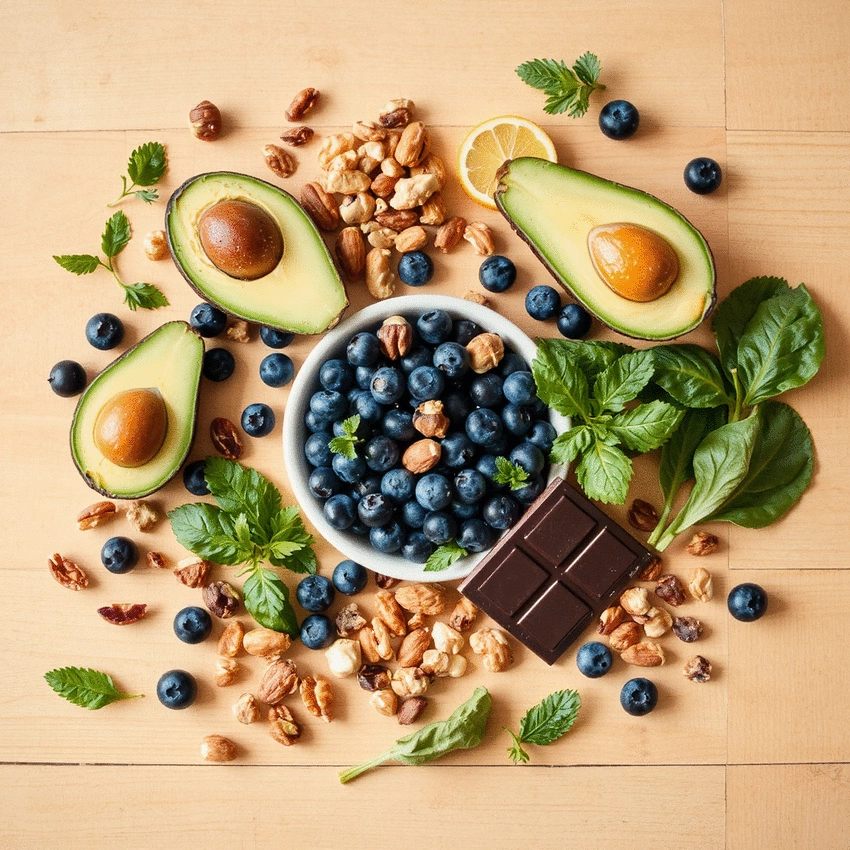Managing Stress with Holistic Methods
By Elara Finch / Oct 10
What if the key to improving your mental well-being lies on your plate? The connection between nutrition and mental health is profound and often overlooked. As we dive into this topic, you'll discover how simple dietary choices can lead to transformative changes in your emotional balance and cognitive function.
Understanding the connection between nutrition and mental well-being reveals several key insights regarding dietary impact on emotional stability.
Improves mood and reduces anxiety. Found in fish, flaxseeds, and walnuts.
Essential for cognitive function and emotional regulation. Present in whole grains, meat, and dairy.
Maintaining gut flora through probiotics enhances mental well-being. Sources include yogurt and fermented foods.
High sugar intake can lead to mood swings and emotional lows. Focus on whole foods.
Have you ever considered how what you eat affects your mood? It’s fascinating to think about the intricate connection between nutrition and mental health. At Coach Wellness Hub, I often discuss with my clients how making mindful dietary choices can pave the way for improved emotional balance. Understanding this relationship can empower you to take charge of your mental wellness. For more insights on improving your overall well-being, explore how you can transform your health with coaching.
Nutrition is more than just fuel for our bodies; it’s a vital component for brain health. When we consume nutrient-rich foods, we’re not only nourishing our physical selves but also supporting our emotional well-being. So, let's delve into the science behind how nutrition shapes our mental health!
The brain is a complex organ that requires various nutrients to function optimally. Research indicates that specific dietary patterns can directly influence our mental states. In fact, a nutritious diet can lead to enhanced brain function and better emotional stability. Let’s look at some key areas where diet plays a role:
By understanding these connections, we can make informed choices that not only benefit our bodies but also enhance our mental clarity and emotional resilience.
The foods we consume can significantly impact neurotransmitter production, which is crucial for regulating mood and emotional responses. For instance, eating a balanced diet rich in fruits, vegetables, and whole grains can promote a healthier brain function. A diet lacking in essential nutrients may lead to increased feelings of stress and anxiety.
Research shows that individuals who follow a Mediterranean diet, which is high in omega-3 fatty acids and antioxidants, often experience lower rates of depression. This kind of diet isn’t just about eating; it’s about embracing a lifestyle that nurtures both body and mind.
Neurotransmitters, such as serotonin and dopamine, play a critical role in our mental health. Many of these chemicals rely on certain vitamins and minerals to be produced effectively. For example, B vitamins are essential for neurotransmitter synthesis and can help improve mood regulation.
Here are some vital nutrients to consider for your mental well-being:
Incorporating these into your diet can create a positive impact on your mental health. As I often emphasize at Coach Wellness Hub, small changes in diet can lead to substantial improvements in emotional balance! For more expert advice, consider our holistic nutrition tips for coaches.
Have you ever heard of the phrase "trust your gut"? It turns out there’s more truth to it than we might think! The gut is often referred to as our second brain, and there's a compelling reason for that. A healthy gut plays a significant role in influencing our mental state. Let’s explore how.
The gut-brain axis is a powerful link between our digestive health and emotional wellness. This connection means that what happens in our gut can significantly affect our mood and cognitive functions. By prioritizing gut health, we can improve our overall mental well-being.
The gut-brain axis is essentially the communication network linking your gut and brain. It’s through this connection that gut microbes can send signals to our brains, influencing how we feel and think. For instance, an imbalance in gut bacteria may lead to an increase in anxiety and depressive symptoms.
Recognizing this relationship can help us take action! By focusing on gut health, we can create a positive ripple effect on our mental well-being.
Probiotics and prebiotics are essential for maintaining gut health. Probiotics are live bacteria that can enhance gut flora, while prebiotics serve as food for these beneficial microorganisms. Including both in your diet can lead to a healthier gut, which, as we’ve seen, can positively impact mental health.
Consider integrating these into your meals:
These simple additions can make a world of difference for your mental wellness journey!
Fermented foods are not just trendy; they hold real benefits for our gut health and mental clarity. Foods like kimchi, sauerkraut, and kombucha are rich in probiotics and can help restore gut balance. By incorporating these vibrant foods into your diet, you’re taking a step towards better mental health.
So why not give it a try? As part of my holistic approach at Coach Wellness Hub, I encourage my clients to explore the world of fermented foods for a balanced gut and a happier mind.
Here's a brief recap of the key points discussed so far:
A: Nutrient-rich foods provide the necessary building blocks for neurotransmitters, which regulate mood. They also support overall brain health, leading to enhanced cognitive functions and improved emotional stability.
A: Omega-3 fatty acids, found in foods like fish and flaxseeds, help improve mood and reduce anxiety. B vitamins, present in whole grains, meat, and dairy, are crucial for cognitive function and the production of neurotransmitters that regulate emotions.
A: The gut-brain axis is a communication network between your digestive system and your brain. A healthy gut microbiome can send signals that positively influence mood and cognitive functions, while an imbalance can contribute to anxiety and depression.
A: Probiotics are beneficial live bacteria that enhance gut flora, while prebiotics are fibers that feed these beneficial bacteria. Together, they promote a healthy gut, which in turn supports the gut-brain axis and can lead to improved mental well-being.
A: Yes, high sugar intake can lead to rapid blood sugar fluctuations, contributing to mood swings and emotional lows. Focusing on whole, unprocessed foods can help stabilize blood sugar and promote more consistent mood and energy levels.
As we wrap up our discussion on the powerful link between nutrition and mental well-being, it’s essential to highlight some key insights. Research shows that the foods we consume play a critical role in our emotional health and resilience. For example, a balanced diet rich in nutrients can help manage stress and enhance our ability to cope with daily challenges.
Understanding that what we eat affects how we feel empowers us to make better choices. Nutritional adjustments not only support our physical health but also foster emotional stability and clarity. This is where the expertise at Coach Wellness Hub comes into play, helping you navigate these decisions with confidence! To further enhance your journey, explore holistic health coaching for beginners.
From our exploration, several key takeaways stand out regarding how diet influences mental health:
Each of these insights reinforces the idea that nutrition is a vital component of mental wellness. By adopting a comprehensive approach to health that integrates nutrition, we can create a more resilient mindset and foster emotional well-being.
Let’s think about stress management. A diet high in processed foods may lead to increased anxiety and emotional fatigue. Conversely, incorporating whole foods—like fruits, vegetables, and lean proteins—can boost your mood and overall resilience. Remember, you have the power to make choices that elevate your mental state!
At Coach Wellness Hub, I encourage you to listen to your body and understand how different foods influence your feelings. This awareness can guide you toward healthier options that not only support your physical health but also your emotional balance.
Making lasting changes is key to reaping the benefits of nutrition for your mental health. Here are some practical strategies to consider:
By gradually incorporating these changes, you’re setting the stage for improved mental well-being. Every step counts, and I’m here to support your journey toward a healthier mindset! Learn more about simple meal planning for coaches to make this process easier.
Now that we’ve covered the importance of nutrition, it’s time to take action! I believe everyone has the potential to enhance their mental wellness through dietary choices. The next step is about making those choices a part of your daily life.
At Coach Wellness Hub, I invite you to explore your unique nutritional journey, where we can work together on strategies that resonate with you personally. It’s all about finding what works best for your lifestyle and well-being!
Implementing nutrition guidance can feel overwhelming, but it doesn’t have to be! Here are some simple steps to get you started:
By taking these steps, you’ll find it easier to sustain a diet that supports your mental health. Let’s make this journey enjoyable and fulfilling together!
Here are a few additional practical tips that can help you enhance your diet:
Embracing new ways to nourish your body will not only enhance your mental health but also bring joy to your meals!
I encourage you to engage in community discussions about nutrition and mental well-being! Sharing experiences and learning from others can be incredibly beneficial.
Consider joining forums or social media groups where these topics are explored. Remember, you are not alone on this journey—together, we can foster a supportive environment that encourages everyone to thrive!
As you continue your journey, it’s important to stay informed. Here are some resources that can support you further:
Keeping up-to-date with new nutrition research will empower you to make informed choices that benefit your mental wellness. Let’s keep exploring this vital connection together! Remember, at Coach Wellness Hub, I’m here to guide you every step of the way! You might also find value in exploring holistic health practices explained for a comprehensive wellness approach.
Here is a quick recap of the important points discussed in the article:

 Managing Stress with Holistic Methods
What if the secret to managing stress lies not in quick fixes but in embracing a holistic approach t
Managing Stress with Holistic Methods
What if the secret to managing stress lies not in quick fixes but in embracing a holistic approach t
 Stress Management for Wellness Coaches
In today's fast-paced world, stress has become an unavoidable part of life—especially for wellness
Stress Management for Wellness Coaches
In today's fast-paced world, stress has become an unavoidable part of life—especially for wellness
 Nutrition's Role in Mental Wellness
What if the key to enhancing your mental health lies in the foods you choose to eat? Recent research
Nutrition's Role in Mental Wellness
What if the key to enhancing your mental health lies in the foods you choose to eat? Recent research